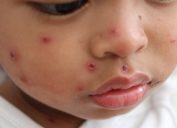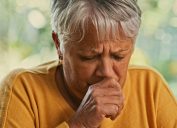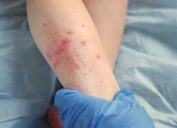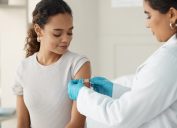CDC Recommends 2 Vaccines for Certain Americans in New Updates
The news was announced at a meeting of the agency's committee on immunization practices.
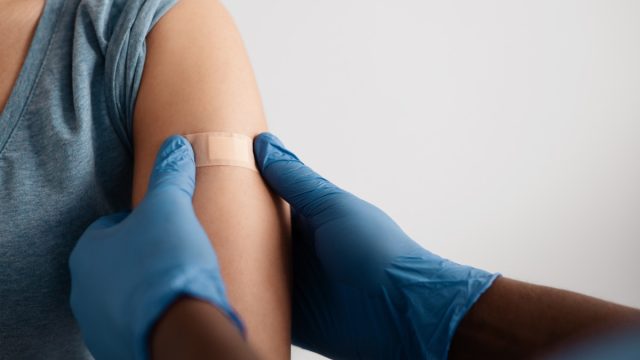
There have been plenty of alarming reports about health concerns lately, including foodborne illnesses caused by Salmonella and Listeria bacteria, and an uptick in measles cases. But unlike bacterial infections such as listeriosis and salmonellosis, there are vaccines for viruses like measles—and the Centers for Disease Control and Prevention (CDC) has been stressing the importance of getting these shots. Now, the CDC has issued new vaccine recommendations for two other viral infections—COVID-19 and chikungunya—in certain individuals.
RELATED: Doctor Reveals the COVID Symptoms That Show Up Before You Test Positive.
The chikungunya virus is spread to humans by infected mosquitoes. It's not endemic in the U.S., mainly reported in travelers returning from affected areas in Asia, Africa, or the Indian Ocean, per the CDC.
However, in late 2013, local transmission of the virus (meaning mosquitoes in the area were infected and spreading the virus to people) was reported in Caribbean countries and territories. The following year, the virus was reported in U.S. travelers returning from these affected areas in the Americas, with local transmission then identified in Florida, Puerto Rico, Texas, and the U.S. Virgin Islands.
Death from a chikungunya infection is rare, according to the CDC, but it can produce troubling symptoms, with the most common being fever and joint pain. Most patients develop symptoms three to seven days after being bitten and then feel better within a week. However, the CDC warns that joint pain "can be severe and disabling and may persist for months." There is no treatment for the virus at this time.
In Nov. 2023, the U.S. Food and Drug Administration (FDA) licensed a vaccine for the chikungunya virus for adults 18 and older—and this week, the CDC's Advisory Committee on Immunization Practices (ACIP) recommended the use of the vaccine (made by Valneva) for those traveling to a country where there is a chikungunya outbreak. The recommendation was announced at the Feb. 28 meeting ACIP meeting.
According to a press release from Valneva, the single-dose shot might also be considered for those traveling to an area where there is evidence of transmission (not a full outbreak) in the last five years. This includes travelers older than 65 with underlying conditions who have a moderate risk of exposure to mosquitoes, and those traveling for longer than six months. It is also recommended for laboratory workers who could be exposed to chikungunya.
According to STAT, this will become official U.S. vaccination policy when CDC Director Mandy Cohen, MD, MPH, signs off on the ACIP's recommendation.
RELATED: Doctor Reveals COVID Symptoms in Patients Who Haven't Gotten a Booster.
Also on the CDC's latest list of recommendations is another round of COVID-19 vaccines. In a Feb. 28 media statement, Cohen endorsed the ACIP's recommendation that older adults, specifically those aged 65 and older, receive an updated 2023-2024 COVID-19 vaccine dose.
"Today's recommendation allows older adults to receive an additional dose of this season's COVID-19 vaccine to provide added protection," Cohen said in the media statement. "Most COVID-19 deaths and hospitalizations last year were among people 65 years and older. An additional vaccine dose can provide added protection that may have decreased over time for those at highest risk."
According to The New York Times, the spring shot is a second dose of the most recent Pfizer-BioNTech, Moderna or Novavax vaccines first introduced in fall 2023.
Per preliminary data presented at yesterday's ACIP meeting, these vaccines have an effectiveness rate between 40 to 50 percent in protecting from symptomatic infections and hospitalizations, the NYT reported. However, estimates against circulating variants were calculated using small numbers.
Best Life offers the most up-to-date information from top experts, new research, and health agencies, but our content is not meant to be a substitute for professional guidance. When it comes to the medication you're taking or any other health questions you have, always consult your healthcare provider directly.
- Source: CDC Clinician Outreach and Communication Activity: Stay Alert for Measles Cases
- Source: CDC: Chikungunya in the US
- Source: CDC: Chikungunya Virus: Symptoms, Diagnosis, & Treatment
- Source: FDA Approves First Vaccine to Prevent Disease Caused by Chikungunya Virus
- Source: CDC: ACIP Presentation Slides: February 28-29, 2024 Meeting
- Source: CDC: Older Adults Now Able to Receive Additional Dose of Updated COVID-19 Vaccine
